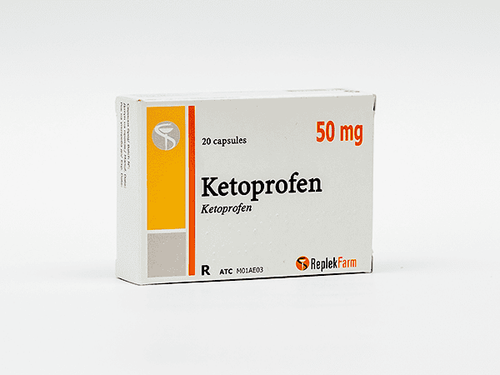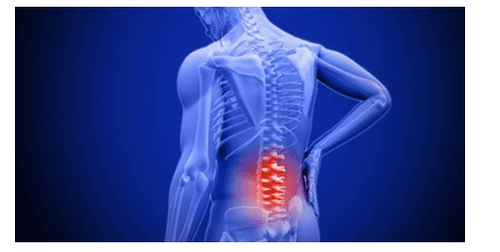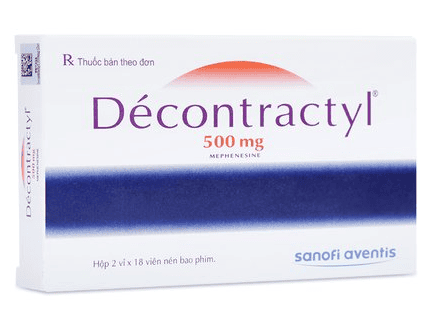This is an automatically translated article.
What does Acemetacin do, does it help with pain? In fact, Acemetacin is a non-steroidal anti-inflammatory drug that has analgesic and anti-inflammatory effects.
1. What are the effects of Acemetacin?
Acemetacin belongs to the group of non-steroidal anti-inflammatory drugs, with the main ingredient being Acemetacin. Acemetacin has analgesic and anti-inflammatory effects.Acemetacin is available as 60mg immediate release capsules and 90mg delayed release capsules. Acemetacin is indicated for the treatment of some conditions of osteoarthritis, rheumatoid arthritis, ankylosing spondylitis, post-operative pain, low back pain.
2. How to use and dose of Acemetacin
Acemetacin is used orally, take the tablet whole with water, do not chew, break or crush the medicine to drink. The medicine should be taken during or after eating.
The average dose of Acemetacin in adults is 30-60mg/time, taking the drug 1-3 times/day. For children with acute gout pain, the dose can be up to 180mg / day and the time to take the drug is until the symptoms are relieved. Alternatively, a higher dose may be used, but not exceeding 300 mg/day, and should only be used in patients without digestive problems.
Acemetacin overdose can cause symptoms such as epigastric pain, nausea, vomiting, gastrointestinal bleeding, diarrhea (rarely), headache, dizziness, drowsiness, tinnitus, irritation, loss of appetite. disorientation, fainting, coma, convulsions (occasionally). Severe overdose can cause liver damage and acute kidney failure.
When Acemetacin overdose, depending on the clinical condition, the patient should be treated symptomatically. Consider activated charcoal or gastric lavage within 1 hour of an overdose. In addition, patients taking Acemetacin overdose should be closely monitored for liver and kidney function to ensure urine output. For a minimum of 4 hours after an overdose, the patient should be closely monitored to prevent severe convulsions. Diazepam should be administered intravenously.
3. Acemetacin side effects
Acemetacin can cause some unwanted side effects with the frequency of occurrence as follows:
Very common: Gastrointestinal disturbances, mild gastrointestinal bleeding, anemia. Common: Flatulence, dyspepsia, peptic ulcer perforation, gastrointestinal bleeding (especially in the elderly); rash, itching; drowsiness, headache, dizziness, agitation, irritability; increased liver enzymes. Uncommon: Acemetacin rarely causes side effects such as gastritis, urticaria, double vision, blurred vision; vomiting, blood in the stool, liver damage; edema, hair loss. Rare: Hyperkalemia, irritability. Very rare: Acute inflammation; thrombocytopenia, hemolytic anemia, hemorrhagic anemia; bronchial asthma, bronchospasm, difficulty breathing, pseudoallergic reactions; skin disorders such as urticaria, rash, purpura, erythema multiforme, pruritus, angioedema, epidermal necrolysis. Acemetacin very rarely causes side effects such as pneumonia, vasculitis; urinary glucose, increased blood glucose; disorientation, psychosis, hallucinations, sensory disturbances, nightmares, sleep disturbances, anxiety, tremors, seizures, depression, coma, loss of consciousness, memory loss; dystonia, muscle weakness; aseptic meningitis, hearing loss. Acemetacin also rarely causes hypertension, heart failure, angina, palpitations; constipation, stomatitis, ulcerative colitis, pancreatitis, Crohn's disease, esophageal lesions; acute renal failure, kidney damage, hematuria, proteinuria, increased blood urea; vaginal bleeding. Frequency not determined: Circulatory failure, dysesthesia, optic neuritis. If you see any abnormality after taking Acemetacin, the patient should immediately report it to a doctor or go to a medical facility for examination.
4. Some notes when using Acemetacin medicine
Do not use Acemetacin in people with hypersensitivity to the ingredients of the drug, allergy to Aspirin, Ibuprofen, Indomethacin or non-steroidal anti-inflammatory drugs; people with a history of or are suffering from peptic ulcer, gastrointestinal bleeding due to gastrointestinal perforation; people with liver failure, kidney failure, severe heart failure; people with nasal polyps accompanied by neuroedema; women who are pregnant in the last trimester; children under 18. In order to limit the side effects of Acemetacin, it is recommended to use the drug with the lowest dose but still achieve the therapeutic effect. Acemetacin should not be used concurrently with other non-steroidal anti-inflammatory drugs. Acemetacin should be used with caution in the elderly because of the increased risk of adverse events such as gastric perforation, gastrointestinal bleeding, and death. People with a history of bronchial asthma or asthma should be cautious when using Acemetacin in particular and non-steroidal anti-inflammatory drugs in general, which can cause bronchospasm, swelling of the nasal mucosa, hypersensitivity reactions, and recurrent asthma attacks. rash, urticaria, mucosal or skin edema. Patients with liver failure, kidney failure and heart failure should be monitored to advise appropriate use of Acemetacin, especially when the patient has hypertension, a history of heart failure, the drug can cause edema and fluid retention. In some patients, depending on the dose, the drug may cause a decrease in prostaglandins and renal failure, especially in patients who are elderly or are taking diuretics. If taking drugs, it is necessary to monitor liver and kidney function in this group of subjects. Consider and caution when using Acemetacin in patients with uncontrolled hypertension, ischemic heart disease, congestive heart failure, cerebrovascular disease, peripheral artery disease because the drug may increase risk of blood clots in small arteries, especially with long-term use of high doses. People with a history of gastrointestinal disease should consider taking additional drugs to protect the stomach lining when taking Acemetacin or taking it at the same time as low-dose Aspirin, or drugs with a risk of causing digestive disorders, because the drug can cause perforation, ulceration and gastrointestinal bleeding, leading to death. People with coagulopathy should be carefully monitored while taking Acemetacin because it can cause platelet aggregation and increase the risk of bleeding. People with systemic lupus erythematosus or mixed connective tissue disorders should use caution when taking Acemetacin because it may increase the risk of aseptic meningitis. Discontinue use of Acemetacin as soon as skin reactions or hypersensitivity reactions such as exfoliative dermatitis, toxic epidermal necrolysis, Stevens-Johnson syndrome, which can lead to death. Visit an ophthalmologist regularly and stop taking Acemetacin if you experience eye abnormalities when taking this medicine to treat chronic arthritis. People with mental disorders, if taking Acemetacin, the symptoms of the disease may be aggravated, including Parkinson's or epilepsy. People with herpes virus or chickenpox should only use Acemetacin when prescribed by a doctor because it can mask the signs of infection and increase the risk of complications. Patients taking Acemetacin need special care if there is surgery before taking the drug or preparing for surgery afterwards. Women who are pregnant, especially in the first or last 3 months, should not take Acemetacin because it can increase the risk of birth defects or miscarriage. If necessary, only the lowest dose and for the shortest possible time should be used. Lactating women should use caution and caution when taking Acemetacin because it is excreted in breast milk in small amounts. Limit activities that require concentration and alertness such as driving or operating machinery while taking Acemetacin because the drug can cause fatigue, drowsiness, dizziness, visual disturbances. Non-steroidal anti-inflammatory drugs should not be used concurrently as the risk of side effects may be higher. Concomitant use of Acemetacin with antihypertensive drugs may reduce the effect of antihypertensive drugs; with ACE inhibitors, diuretics, receptor blockers may increase the risk of nephrotoxicity; with potassium-sparing diuretics may increase blood potassium. Concomitant administration of Acemetacin with Digoxin or Cardiac Glycosides may increase the concentration of Glycosides in the blood plasma, worsening of heart failure, and decrease in glomerular filtration rate; with Lithium, Methotrexate, Penicillin, Phenytoin can reduce the elimination of these drugs. Concomitant administration of Acemetacin with Mifepristone may reduce the effect of Mifepristone; with corticosteroids may increase the risk to the gastrointestinal tract; increase the effect of anticoagulants. Concomitant administration of Acemetacin with selective serotonin reuptake inhibitors or antiplatelet agents may increase the risk of gastrointestinal bleeding and decrease its efficacy; With Probenecid, Sulfinpyrazone can reduce the elimination of active substance Acemetacin. Concomitant administration of Acemetacin with Furosemide may increase the excretion of the Acemetacin component; with antipsychotics that can induce sleep; with antacids can reduce the rate of reabsorption of the active substance Acemetacin; With alcohol can increase side effects on the nervous or digestive system. To limit the effects of drug interactions when taking Acemetacin, it is best for the patient to provide the doctor with a list of drugs that have been or are being used, which must be full of prescription and non-prescription drugs, foods. functional or herbal products. The use of Acemetacin is anti-inflammatory, pain relief in patients with osteoarthritis, rheumatoid arthritis, ankylosing spondylitis, post-operative pain, low back pain. Because Acemetacin is a prescription drug, patients are not allowed to use it on their own, but need to contact a doctor or professional person directly to have a suitable prescription to ensure safety for health.













